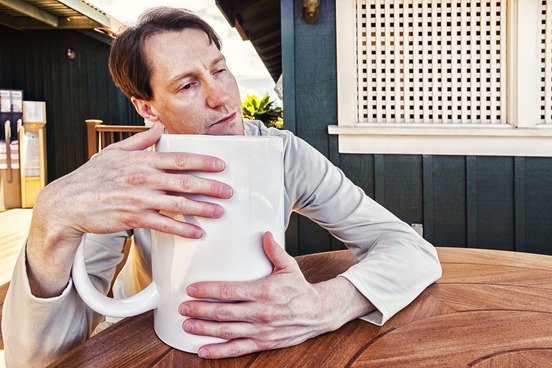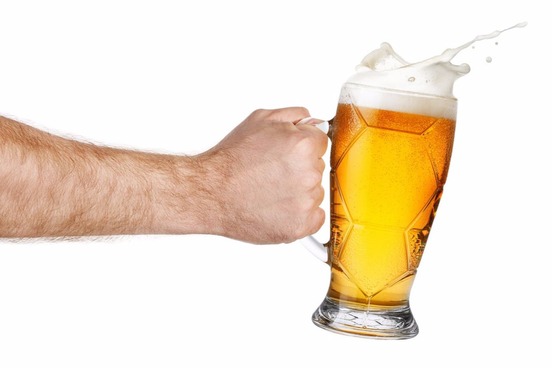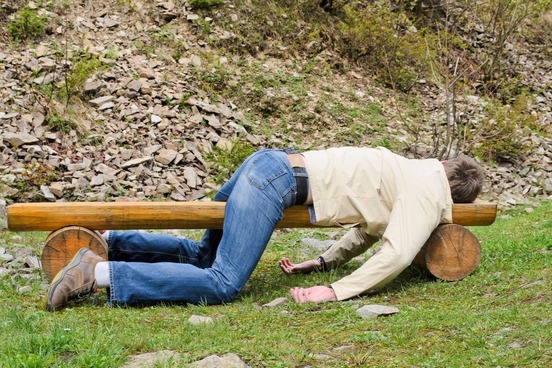
Fuddler
Definition: - drunkard
Fuddler comes, reasonably enough, from fuddle, a word which has been confusing speakers of English for well over 400 years now. Fuddle has meant, at one time or another, “to take part in a drinking bout,” “to make drunk,” “to make confused,” and, most importantly, “to make a fish torpid.”
Please don’t ask us to explain the whole ‘making a fish torpid’ thing.
A Fidler & Fudler, are always together,
like Fidle & Case there was both, or else neither,
united Companions the like never known,
& may be compared to two parts in one,
the Fidler did Fuddle, & the Fuddler did Fiddle,
a Unison sure doth unriddle the Riddle.
— Henry Purcell, The Catch Club, 1690

Swillbowl
Definition: - drunkard
What is currently the earliest record we have of the word swillbowl comes from Robert Whytyngton’s 1532 translation of Desiderius Erasmus’s A Little Book of Good Manners for Children (aka A Lytell Booke of Good Maners for Chyldren), in the section dealing with table etiquette.
Most of the directions are much what one would expect, even for a book that is almost 500 years old. The section deals with what children should be expected to know about washing (“sytte nat downe unto thou have washed”), elbows on the table (“pardoned to them that be weake and feble”), and where one should place the drinking vessels (“let the cuppe stande on the ryght hande“).
Oh, and there are also instructions for teaching children how to drink booze. Relax, it’s not what you think. Okay, fine, it's exactly what you think. (At least Erasmus recommends kids drink small ale, rather than straight wine, so it's almost like he's teaching them to drink responsibly, right?)
Furthermore he says that children shouldn’t begin drinking before the second course has started (“A chylde to drinke oftenner than twyse or thrise … is neyther manerly nor holsome. Let him drinke ones after he hath fedde awhyle vpon the seconde dysshe….”), nor should they get too far into their cups: “drinke nat lyke a swylbolle, nat suppynge or smackynge with the lyppes lyke an horse.”

Borachio
Definition: - drunkard
Borachio comes from the Greek word pyrrhos, meaning “red, tawny.” No, that etymology was not written by a drunkard. The Greek pyrrhos turned into the Latin burrus (“red, flushed with food or drink”), which became the Spanish borracho (“drunkard, intoxicated”), which in the 17th century came into English, in use to refer both to a drunkard and to a wineskin.
In vino veritas Aunt,---If I drunk your Health to day Cosen---I am a Borachio. But if you have a mind to be Marry'd, say the Word, and send for the Piper, Wilfull will do't. If not, dust it away, and let's have tother round.
— William Congreve, The Way of the World, 1700

Rumdum
Definition: - drunkard
Rumdum came into the English language in the late 19th century, first as an adjective, and shortly thereafter as a noun. The adjective appears to have come about to describe a state in which a person has partaken of enough rum as to be incapable of speech, or dumb. Please note that the “lacking the ability to speak” sense of dumb is now considered offensive.
The game of baseball played at American League Park yesterday between the “High Balls” and the “Rum Dumbs,” of the Chesapeake Brewery, was simply great.
— The Sun (Baltimore, MD), 3 May 1902

Bloat
Definition: - drunkard
John Stephen Farmer’s classic 1890 work Slang and its Analogues describes a bloat as either “a drunkard” or “a drowned body.” Farmer additionally notes that “the simile which groups the two is, perhaps, not far wrong,” and informs readers that these uses of bloat are part of the parlance of American thieves. In case you are wondering to yourself “how have I made it thus far in life without the knowledge of so useful and trenchant a word?” it is because bloat was never terribly common (for describing either a drunken or a drowned person), so please do not feel bad about this.
We were yesterday requested by several persons to view a new and splendid banner painted expressly for “the Jefferson Society for the Mutual Improvement of Reformed Drinkers.” … The painting is very characteristic; it represents an “old bloat,” out at the elbows and out at his toes, wending his way to the almshouse accompanied by his wife and several children, and is executed in a masterly style.
— Public Ledger and Daily Transcript, (Philadelphia, PA), 17 Jun. 1841

Inebriate
Definition: - drunkard
Inebriate is perhaps not as uncommon a synonym for drunkard as most of the other words on this list, as the verb use of the word is fairly common. However, the noun sense of inebriate is relatively rare, and has a elegant Latin root, so we have decided to include it. The verb and adjective uses of inebriate both date to the 15th century, with the noun showing up late (and tipsy) in the 18th. The Latin word it may be traced to is ebrius, meaning… you guessed it, “drunk.” Sober, on the other hand, comes from the Latin sobrius.
It is certainly no uncommon occurrence to see an inebriate who can neither walk or (nor) speak exercise so considerable a degree of mental power, as to recollect every circumstance that passes; yet so conscious of his inability to move without staggering, that he cunningly watches the opportunity, when unperceived by his companions, to take his leave.
— Universal Magazine (London, UK), Oct. 1804

Tosspot
Definition: - drunkard
Pot has been used for many hundreds of years to refer to a vessel from which one might drink alcohol of one type or another. Additionally, one of the many senses of the verb toss is “to tilt suddenly or steeply so as to drain.” Put them together and you get the kind of person you’d rather not sit next to on a train.
But no maruayle if Hosius be called a drokard, for euen so was hys Master Chryst before hym called a wyne bybber, which is all one to say a quasser, a tosse potte.
— Stanislaw Hozjusz, A Most Excellent Treatise of the Begynnyng of Heresyes in oure Tyme (trans. By Richard Shacklock), 1565

Stewbum
Definition: - drunkard
The bum portion of stewbum is thought to be a shortening of the earlier word bummer, which probably comes from modifying the German word bummler (“loafer”). Stewbum has been in use since the late 19th century, several decades older than its cousin, the stumblebum (“a clumsy or inept person; especially an inept boxer”).
The ex-boss does not desire “de push” to immediately jump to the conclusion that he is dispensing free drinks for politics. Times are not as flush as they used to be. It is hard to get money, and until there is some way of raising campaign funds “de push”—“stew bums,” “hopheads” and all—will have to go dry and husky.
— The San Francisco Call (San Francisco, CA), 21 Sept. 1895

Rumpot
Definition: - drunkard
Rumpot looks and feels like it’s an old word, but it’s not, having been in printed use for about 100 years now (this may be old for a person, but for a word it's a drop in the bucket). The rum portion of the word is thought to have come about as a shortening of a longer rum- word, such as rumbullion (the origin of which is unknown).
Our earliest evidence of rumpot comes from a rather odd advertisement from 1917, placed in a newspaper by an insurance company. The ad is written entirely in doggerel, and tells a cautionary tale of a man who has just bought a new car, and opted against insuring it. First he runs over a pig, and soon after hits a woman with his vehicle (“…one day he ditched a dame, so that she’d never look the same, and as the stretcher bore her off, John heard what seemed a death-bed cough…”). After being sued for a considerable sum of money the fellow learns his lesson and purchases lots of insurance. Every one is happy. Except the pig, who likely received no financial recompense.
At everything that Daniel said,
He’d take his chance, he knew the game,
He’d prove the other man to blame
If any rumpot was run down.
— (Advt.) The Parsons Daily Sun (Parsons, KS), 29 Sept. 1917

Shicker
Definition: - drunkard
Shicker is similar to a number of the other words on this list in that it existed as an adjective (meaning “drunk”) before becoming used as a noun. However, it also differs from the rest in that it is the only one which comes from Yiddish (from shiker, which is from the Hebrew shikkōr).
The adjective began to be used in the late 19th century (a guide to Yiddish in The Cincinnati Enquirer from 1880 explains “A drunken man is said to be ‘shicker,’ a crazy man is ‘meshugnar’”….), and by the early 20th century had assumed noun-hood as well.
Cordially Yours, No. 37.
If in need of wines and liquors,
Cordials we have just as well;
This does not allude to (shickers),
For to families we can sell;
So when you think you feel inclined
Don’t let us slip through your mind.
Morris Fischler, 37 Hiram St.
(Advt.) The Central New Jersey Home News (New Brunswick, NJ), 20 Sept. 1905





